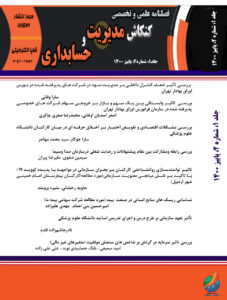مقاله: پژوهشی
صفحه: 249-248
نویسندگان:
محمدرضا حمیدی زاده[1]*، محمدامین عبدی[2]، منیژه قرهچه[3]، گلزار رضوانی[4]
[1] استاد گروه مدیریت بازرگانی، دانشگاه شهید بهشتی، اوین، تهران، ایران
[2] دانشجوی دکتری مدیریت بازرگانی، دانشگاه علامه طباطبایی، تهران، ایران
[3] دانشیار گروه مدیریت بازرگانی، دانشگاه شهید بهشتی، تهران، ایران
[4] کارشناس ارشد مدیریت بازرگانی، دانشگاه شهید بهشتی، تهران، ایران
چكيده
هدف پژوهش حاضر، تعیین کارکردهای تعرفههای گمرکی و ارزیابی آثار آن بر متغیرهای کلان اقتصادی است. ازاینرو، سه متغیر نسبت تمركز، درصد تغيير در واردات و ميانگين ساده سالانه تعرفهها، از طریق مصاحبه با 25 نفر خبره، از میان 11 متغیر اولیه استخراجشده از مبانی نظری و پیشینه تحقیق، بهعنوان عوامل تعیینکننده تعرفه نهایی شدند. اثر اين سه متغير بر متغيرهاي كلان اقتصادي با دو رویکرد متفاوت ارزیابی شد. در رويكرد اول نظرات 108 مدير و کارشناس شركتهاي خودروسازی، از طریق پرسشنامه جمعآوری و با استفاده از آزمون نيكوي برازش تحليل شد. نتایج حاكي از تأثیر معنادار تعرفه گمرکی خودروهای سواری بر نرخ تورم، نرخ بیکاری، شاخص قیمت واردات و تراز تجاری است. در رويكرد دوم دادههای ثبتی متغیرهای پژوهش طي 24 سال (1396-1373) با روش معادلات ساختاری و تکنیک تحلیل مسیر آزمون شد. نتایج، تأثیر معنادار تعرفه گمرکی خودروهای سواری بر تولید ناخالص داخلی، شاخص قیمت واردات و تراز تجاری را تائید میکند. با توجه به نتايج هر دو رويكرد، تعرفههای گمرکی خودروهای سواری تأثیر معناداری بر متغیرهای کلان اقتصادی دارند.
کلمات کلیدی: تعرفه گمرکی، متغيرهاي كلان اقتصادي، تولید ناخالص داخلی، شاخص قیمت واردات، تراز تجاری
Relationship between communication channels and bank customer loyalty (Bank Mellat case study)
Mohammad Reza Hamidizadeh [1] Mohammad Amin Abdi [2], Manizheh Gharache [3], Golzar Rezvani [4]
[1]. Professor, Department of Business Administration, Shahid Beheshti University
[2] PhD candidate of Business Administration, Allameh Tabatabai University
[3].Associate Professor, Department of Business Administration, Shahid Beheshti University
[4]. Master’s degree in Business Administration, Shahid Beheshti University
Abstract
The purpose of the present study is to determine the functions of customs tariffs and evaluate their effects on macroeconomic variables. Therefore, through interviews with 25 experts, the three variables included concentration ratio, percentage change in imports and annual simple average of tariffs, among the 11 initial variables extracted from the theoretical foundations and research background, were finalized as determinants of tariffs. The effect of these three variables on macroeconomic variables was evaluated by two different approaches. In the first approach, the opinions of 108 managers and experts of car companies were collected through a questionnaire and analyzed using goodness of fit test. The results show a significant effect of customs tariffs for passenger cars on inflation rate, unemployment rate, import price index and trade balance. In the second approach, the data records of the research variables were tested over a 24-year period (1994-2017) using structural equation method and path analysis technique. The results confirm the significant effect of customs tariffs for passenger cars on GDP, import price index and trade balance. According to the results of both approaches, passenger car tariffs have a significant effect on macroeconomic variables.
Keywords: Tariffs, Macroeconomic Variables, GDP, Import Price Index, Trade Balance
